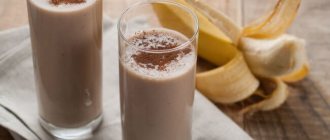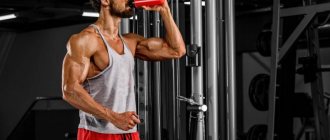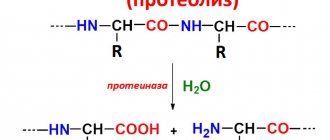Hello to strapping guys and graceful ladies! Ivan Ustinov and I welcome you to my resource. Today we will talk about sports nutrition, a fairly popular topic, namely what to drink for muscle growth. The question is really worthwhile, so we will try to cover the topic as best and as clearly as possible.
Now we will get acquainted with drinks for building muscles, vitamins that will stimulate our muscles, and other “offal” in this topic. Of course, I’m joking about the “offal,” because everything is very serious. But let's not beat around the bush. Let's begin...
Protein
Protein is popular and known to everyone, even people just thinking about joining bodybuilding. For example, it is a source of building material not only for muscles but also for the synthesis of testosterone (the most important male hormone), so necessary for energetic and effective workouts.
It also gives a powerful boost to the regenerative abilities of our muscle fibers. In short, this is a cool thing, well, you understand... And in general, dietary supplements for muscle growth are a huge force when used with the brain.
Despite the fact that there are many types of proteins (read more about this here), many people consume only a few main types of protein: whey and casein. Guys drink the first before and after training for intense exercise and accelerated recovery of muscle mass, because this type of protein is quickly absorbed and immediately supplies the muscles with raw materials for growth.
The second one can be taken before bed, as it is absorbed for a long time and is able to nourish muscles damaged by training throughout sleep. This is the main advantage of casein protein over whey. However, as it turned out, casein is not so cool. I wrote about this in more detail in this article.
Directions: Whey protein mixed with water or juice thirty minutes before exercise to fuel muscles and after exercise in a volume of 20 to 30 grams along with carbohydrates to close the metabolic window. Mandatory protein intake is after waking up. Many people consume a portion of BCAA amino acids on an empty stomach; this is a more expensive but more refined and effective form of protein that is absorbed very quickly.
Types of sports nutrition for gaining muscle mass
Sports nutrition for gaining muscle mass can be taken not only by men, but also by girls. Direct use of supplements does not affect the growth of muscle fibers. In addition, muscles will only emphasize the beauty of the female body, and will not make it masculine.
Sports nutrition saturates the body with essential nutrients, which protects muscles from destruction and helps the athlete recover faster after training. Some nutritional supplements are aimed at supporting the health of joints, ligaments and the immune system, which are under stress during intense exercise.
Beginners can do without sports nutrition altogether. In the first months, muscle mass for beginners will grow quite quickly.
Protein
One of the most popular types of sports nutrition is protein. It contains a large amount of protein (about 20-30 grams per serving), which is necessary for building muscle fibers.
A person who wants to increase muscle at home or in the gym needs to consume about 2 g of protein per kilogram of weight. It is usually difficult to get this amount from food.
In addition, when gaining weight, you should maintain a certain ratio between proteins, fats and carbohydrates. Protein makes it possible to obtain pure protein without unnecessary impurities.
There are several types of protein:
- whey - as much as possible purified from fats and carbohydrates, due to which it is absorbed faster than others;
- casein is the “slowest” protein, nourishing the body for 6-8 hours;
- egg - is a cross between whey and casein protein in terms of absorption rate and has the best amino acid composition;
- complex - combines the components of all of the above types of additives;
- soy - contains only vegetable protein, therefore suitable for vegetarians, but has a weaker amino acid set.
Whey protein is most often taken in the morning, before and after a workout. It is recommended to drink casein at night to prevent muscle breakdown during sleep.
Making a protein shake is very simple. You just need to dilute a measuring spoon of powder in 200-300 ml of water, juice or milk.
Gainer
Gainer, like protein, is rich in protein, but contains a lot of carbohydrates, as a result of which it has a high calorie content. Thanks to this, it promotes accelerated weight gain.
It is recommended to use the gainer after training. At this time, the body experiences hunger, as intense exercise depletes the carbohydrate glycogen reserves. If you don't replenish it, the muscles will begin to break down.
But do not forget that a gainer is a high-calorie supplement. One serving can contain more than 1200 kcal and 250 g of carbohydrates. Therefore, it is recommended to drink it only for ectomorphs (thin by nature), who practically do not risk gaining excess weight. Everyone else is advised to prefer protein.
Creatine
Another supplement that can help you build muscle faster is creatine. This substance is absolutely natural, as it is produced in the human body.
Creatine is necessary for the resynthesis of energy, the reserves of which are consumed very quickly during physical exercise. To increase the effectiveness of your workout, it is worth taking additional doses of creatine externally. You can get them from common foods: meat, fish, some vegetables and dairy products. But the creatine content in food is not that high. Therefore, it is almost impossible to meet the daily need for this substance with the help of products every day.
This is why many athletes take creatine as a supplement. This allows you to increase strength and working weights, which directly affects the rate of muscle gain.
Now manufacturers produce many different types of creatine: citrate, tartrate, phosphate, crealkaline, etc. But the most proven and effective is creatine monohydrate.
In addition, there are several forms of release of this supplement:
- powder;
- capsules;
- pills;
- liquid.
The most accessible and common form is powder. It must be dissolved in water, but it is advisable to use sweet juice (grape, cherry), since fast carbohydrates act as a transport system for creatine, due to which it is absorbed much better.
The daily dose of creatine for athletes involved in strength training is 5 g. But there is another dosage regimen that involves loading with a large dose of creatine over several days.
BCAAs
BCAA is an amino acid complex of valine, leucine and isoleucine. These three amino acids are essential and make up about 35% of the total amino acid composition of muscles.
In stores you can find BCAA in different forms:
- liquid;
- powder;
- capsules.
It is worth consuming BCAA when losing weight in order to maintain muscle mass. Drink the supplement in the morning to prevent catabolism, before, during or after training.
Glutamine
Another important amino acid is glutamine.
It performs several functions:
- helps muscles recover faster after training;
- increases endurance and reduces fatigue in classes;
- improves digestion;
- strengthens the immune system.
You can take glutamine just like BCAA: in the morning, before or after training. In addition, this supplement can be combined with others: protein, creatine and amino acids, as it can enhance their effect.
This supplement is available in the form of powder, capsules and tablets. But you should avoid ready-made bars and shakes with glutamine, as it is very unstable.
Arginine
Arginine is a partially essential amino acid. In the body it is converted into nitric oxide.
Taking arginine alone does not help build muscle. It only improves the flow of blood and nutrients to the muscles, dilating the blood vessels.
The optimal time to consume arginine is in the morning and 10-20 minutes before training. It is during this period that it is especially necessary to improve the body’s supply of nutrients.
Pre-workout supplements
Pre-workout complexes or boosters are used to increase the intensity and effectiveness of exercise. This indirectly helps build muscle faster.
Most of these supplements contain caffeine or taurine. These components help you cheer up and give a boost of energy.
In addition, pre-workout supplements may contain amino acids and other beneficial substances such as arginine, betaine, BCAA, beta-alanine, creatine, etc.
It is worth considering that you need to take boosters very carefully. They stimulate the nervous system, which can negatively affect the psychological state and cause insomnia.
In addition, diseases of the cardiovascular system are contraindications to taking pre-workout complexes.
Testosterone booster
Testosterone boosters increase the production of the so-called “male” hormone - testosterone. It is what causes muscle growth and increases libido.
The composition of such boosters includes various vitamins, natural and synthetic substances. The question of the safety of their use remains open. After all, consuming an additional dose of testosterone leads to suppression of the natural production of this hormone.
As a result, there is a risk of decreased sexual function and loss of muscle mass, since the effect of testosterone boosters ends immediately after the end of use.
If you decide to take such supplements, you should drink them before training or between meals.
ZMA
ZMA is a supplement that is a combination of zinc, magnesium and vitamin B6. Sports nutrition manufacturers claim that taking ZMA increases the production of IGF-1 (insulin-like growth factor) and testosterone.
In addition, zinc, which is part of the product, helps accelerate muscle recovery. And magnesium normalizes the state of the nervous system, which improves the quality of sleep and has a positive effect on muscle mass gain.
Based on its properties, it is recommended to use ZMA at night.
Tribulus
Another drug that increases testosterone production in the body is Tribulus. The main substance in this supplement is the plant of the same name. Its extract tones and improves performance due to its effect on the central nervous system. In addition, the extract of this plant enhances the synthesis of growth hormone.
While taking Tribulus, muscle growth really accelerates. But you can’t use it regularly, as the body needs rest to prevent addiction.
In the intervals between doses, processes may decline and libido may decrease.
You can find this drug not only in sports nutrition stores, but also in pharmacies, although it is not a medicinal product.
Antioxidants
With regular heavy training, you should think not only about muscles, but also about health. To maintain it, you can consume antioxidants. They help eliminate free radicals in the body.
First of all, you should pay attention to vitamin E. It increases skin elasticity, strengthens nails and makes hair smooth. In addition, vitamin E helps block catabolic processes and helps muscle fibers recover faster.
Vitamin C is also indicated for athletes. Its use helps maintain healthy joints and protects against common diseases associated with a weak immune system.
Vitamin and mineral complexes
Vitamin and mineral complexes for athletes are more concentrated. This is necessary because trainees are exposed to much more severe physical activity than ordinary people.
Taking such complexes helps protect joints and ligaments from damage. Many supplements contain components such as vitamins A, C, E, D and B vitamins, as well as calcium, magnesium, sodium, phosphorus, collagen, etc.
The most famous vitamin and mineral complexes for athletes are supplements from Optimum Nutrition. They are available in two forms: for men and women. The first ones are called Opti-Men, and the second ones are called Opti-Women.
Omega-3
Omega-3 fatty essential amino acids promote accelerated recovery after exercise, have a positive effect on heart function and normalize blood pressure. In addition, an important advantage is that these acids improve the condition of the skin, hair, nails and strengthen the immune system.
You can get Omega-3 from regular foods, but most athletes take fish oil capsules. This is more convenient and helps you easily meet your daily fatty acid needs.
You can drink fish oil once a day or break the daily dose into several servings. Moreover, the capsules must be taken with food. This will protect you from digestive disorders.
Gainer
Gainers are suitable as protein and carbohydrate mixtures. During intense exercise, the body loses a large amount of energy. Energy reserves are located in muscle tissue - in glycogen. But the body has enough of it for about 45 minutes of training, then it runs out and tissue destruction begins; our muscles are also damaged by cortisol.
To avoid this undesirable moment, you need to take gainers. Gainers contribute to the increase in adipose tissue, so watch the dosage: you should not use it for breakfast, but it is recommended half an hour before training and shortly after it. Here is a more detailed article about gainers, read it.
Sample menu for increasing muscle mass
List of dishes and time of their consumption:
- Breakfast - porridge (buckwheat, oatmeal), milk, omelet, fruit (bananas, apples), green tea with honey. In the morning you can eat something sweet (fast carbohydrates), but in small quantities.
- Snack No. 1 – cheese, white bread, cottage cheese, fruits or dried fruits, nuts, kefir.
- Lunch - any soup, rice, fish, buckwheat with chicken, vegetable salads, stewed, baked or boiled potatoes, eggs, fruits.
- Snack No. 2 – cottage cheese, dried fruits, apples, cheese, oatmeal, dark chocolate.
- Dinner – meat or fish, maybe some porridge, fruit or juice, tea.
- Before bed – milk, kefir, apple nuts. To gain muscle mass, you can also eat cottage cheese at night. At least half an hour before bedtime and in small quantities.
Creatine
Creatine, a natural substance in the body, plays an important role in the structure of the body. 95% of it is found in muscle tissue and 5% is synthesized throughout the body. Creatine is your energy and strength during exercise. You need to drink 2-5 grams per day. I recommend reading more about creatine.
But the role of creatine is slightly exaggerated, that is, the need for additional intake for everyone, since it does not give the expected effect for everyone. We are all individual and the reaction to sports supplements is no exception. Personally, I have heard many times from guys that they bought creatine and then gave it as a gift to others, because they themselves could not handle a jar or package of this supplement.
The same thing happened to me. I took it, tried it, gave it away. But good creatine is not cheap, so don’t rush to buy it, first find out the necessary conditions for taking it and what side effects there may be. But on the other hand, if you don’t take it, you won’t know how it affects you personally.
Beginners in training can focus on the ineffectiveness of training: long and frequent training, but there are no visible results. Of course, you can gain muscle mass without additional supplements, but this path will be much longer and harder. And with high-quality supplements for muscle growth, you will not harm your health, since these supplements are natural.
BCAA
It is impossible not to mention BCAA - branched amino acids. There are more than 200 amino acids in the body, and 22 necessary for metabolic processes, and three of them occupy a leading position in the role of muscle growth:
- Leucine.
- Isoleucine.
- Valin.
The role of BCAAs = stimulation of muscle growth + fat metabolism + accelerated fat burning + improvement of metabolism.
Amino acid intake regimen: three to five grams after waking up, the same amount before and after training. Yes, many protein powders already contain amino acids, but they need to be taken separately for intense workouts in the gym. A more detailed article about BCAA is in addition to you.
How many times a day can you eat food?
The usual eating plan that most people use, which is breakfast, lunch and dinner, is not suitable for bodybuilders. Since the breaks between meals are quite long, athletes have time to get very hungry during this time, since their metabolic processes go through much faster. The feeling of hunger forces the athlete’s body to feed on energy reserves that are always in the athlete’s body.
At these moments, the body begins to secrete the hormone cortisol, which begins to burn muscles, in conditions of decreasing energy potential of the body.
In addition, he begins to burn carbohydrates stored in the liver and muscles, and this cannot be allowed, since muscle mass is lost, which the athlete is trying to build up in training. Glycogen levels also decrease, which is an indicator of readiness for the next workout. The higher the level of glycogen in the liver and muscles, the greater the athlete's endurance and the greater his performance. In this case, the athlete needs to eat about 6 times a day, but in smaller portions. By reducing the time between meals, the athlete's body is constantly fed with glucose, which comes from the intestines. At the same time, the body does not touch glucose reserves and does not produce cortisol. But this is just one advantage of this approach to nutrition for athletes.
Eating according to this scheme speeds up the metabolic process, which also leads to accelerated muscle growth. There is another very important advantage of frequent meals: amino acids constantly nourish muscles, ensuring their growth. The constant presence of amino acids in the blood makes the athlete’s body more resistant to various negative external factors. Naturally, stable immunity contributes to more effective and high-quality training.
Vitamins
The topic of sports and bodybuilding cannot ignore the question: what vitamins are needed to improve training performance and restore the body?
For the healthy and uninterrupted operation of all systems, all groups of vitamins are needed, but taking each vitamin separately is tedious and extremely inconvenient, and there is no time for this, so multivitamins are quite suitable. It is not necessary to take each vitamin separately, although you can find them on sale. Of course, the exception is the case when your body is deficient in a particular vitamin.
Here is a list of vitamins that will help you with muscle growth and their brief characteristics:
- Vitamin A - improves vision, is involved in protein synthesis, and this is so important!
- Vitamin E is a powerful antioxidant. This vitamin thickens the cell membrane, as a result of which the cell becomes more resistant to viruses, muscles recover faster because muscle cells regenerate faster
- Vitamin D – needed for the absorption of phosphorus and calcium. Without these minerals, muscles will not contract as well as they should during tough workouts. Phosphorus is also needed for the synthesis of energy molecules ATP (adenosine triphosphate).
- Vitamin C (ascorbic acid) - well, where would we be without it? It is also an antioxidant and forms collagen (a substance that is part of connective tissue). And connective tissue is our ligaments and joints. Therefore, vitamin C is injury prevention. In addition, vitamin C is involved in the synthesis of testosterone. And there is no need to say how important this is.
- Vitamin B1 (thiamine) – is involved in the synthesis of hemoglobin. This protein carries oxygen in red blood cells to our muscles. The importance of oxygen supply to the working muscle is colossal.
- Vitamin B2 (riboflavin) - a lot can be said about this vitamin, but for bodybuilding its most important function is its important role in protein synthesis. In short, the more riboflavin, the more muscle. This close connection can be seen very clearly and undeniably. This vitamin increases endurance and participates in energy exchange processes.
- Vitamin B3 (niacin) is needed to participate in energy production processes in our body.
- Vitamin B6 (pyridoxine) – needed for protein absorption. Since bodybuilders eat a lot of protein, they desperately need this vitamin.
- Vitamin B12 (cobalamin) – participates in the metabolic processes of carbohydrates in the body. Supports nerve cells and tissues of the nervous system.
- Biotin – ensures the metabolism of amino acids and helps produce energy from various sources.
Omega-3 fatty acids are a great thing. They are also actively eaten and drunk by bodybuilders to stimulate muscle growth. Consider the fact that vegetable omega (for example, flaxseed oil) does not provide as many benefits as omega from fish (fish oil). An additional article on this topic will not hurt you.
Glutamine
Pay attention to glutamine. This is what athletes drink during long and frequent workouts. Since glutamine is a non-essential amino acid, that is, the body can build it for itself, but still serious and even frivolous jocks eat it with a bang. Why?
- Firstly, it prevents catabolism.
- Secondly, it promotes the production of growth hormone.
Its lack also becomes a problem for the immune system, so its reserves certainly need to be replenished if you train hard in the gym. It can be taken, for example, 2 times a day. Once with breakfast and another time immediately after training with a protein shake.
Meat for a bodybuilder: basic principles of choice
Let us immediately note that pork and beef mean exclusively raw meat, which you will later prepare yourself. Products containing these types of meat, such as ready-made minced meat, dumplings, burgers, and other semi-finished products, have nothing to do with our article, since they are not capable of bringing full benefit.
Let's talk about the features that distinguish good meat from the kind that people who want to eat healthy should not eat. There are two fundamental principles for choosing healthy meat for the human body:
1. Give preference to meat from young animals
Meat from calves, piglets, and including lambs will bring more benefits to the body, since it contains a reduced amount of fat and a lower percentage of mature collagen. This principle will not only reduce the calorie content and fat content of consumed meat, but also improve its taste.
2. Meat should be fresh, but within reason.
Only chilled meat, which has an extremely short shelf life, can be considered healthy. Therefore, it is so important to pay attention to the absence of an unpleasant odor and a grayish tint to the meat. However, beef and pork obtained from slaughter less than a day before your purchase is also not suitable: such meat contains a lot of blood, due to which it has an unpleasant aftertaste.
In addition, there are a number of features that pork and beef have separately.
How to prepare drinks
You can’t ignore the ways to prepare protein or gainer drinks at home. Proteins and gainers are mixed with plain still water or juice (freshly squeezed or packaged at your discretion). They are often drunk with milk, and people with lactose intolerance drink them with kefir.
The best combo for a gainer is water, since with the other mentioned fillers, it becomes full of carbohydrates and calories, which it already has in abundance. Protein loves milk if it has a minimum percentage of fat content and is combined with kefir.
The remaining powders are mixed only with water and drunk immediately after dilution, since in liquid form these additives are chemically unstable.











